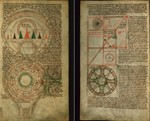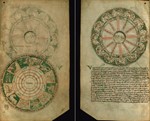Cosmography
Content: text (48 symbols)
Uploaded: 01.12.2018
Positive responses: 0
Negative responses: 0
Sold: 4
Refunds: 0
$0.5
This book, created at the end of the XII century in England, was to serve as a scientific textbook for monks. It is a short compendium of cosmographic knowledge on nine pages, based on the work of such early Christian writers as Bede and Isidore, as well as Abbon from Fleury, who lived at a later time. These authors, in turn, drew knowledge from classical sources, including from the works of Pliny the Elder, but at the same time adapted them, expounding them in the light of Christian understanding. For clarity, the text of the brochure is accompanied by 20 complex schemes depicting heaven and earth, seasons, winds, tides and zodiac signs, as well as manifestations of the relationship between them and man. Most schemes have the form of rotae (pie charts), widely used in the Middle Ages to demonstrate scientific and cosmological ideas thanks to a clear and orderly presentation of information, which facilitates its understanding, study and memorization. Moreover, there was an opinion that the circle, considered the most perfect form and symbol of God, embodies the cyclical nature of time and the universe and symbolizes the logic, order and harmony of the created Universe. Illustrated scientific textbooks were especially popular in England. The first of them were released in the Carolingian era under the influence of the famous Benedictine scholar Abbone of Fleury, who for two years taught at Ramsay Abbey. Although the texts and schemes in this work are grouped in a unique way, this manuscript is associated with other scientific compilations of that era, such as the Royal Ms. manuscripts. 13 A.XI and Cotton Ms. Tiberius E.IV in the British Library and the manuscript Ms. 17, held at St. Johns College, Oxford.
No feedback yet

